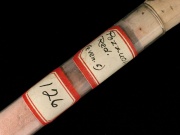Difference between revisions of "Pozzolana"
m (Text replace - "\[http:\/\/cameo\.mfa\.org\/materials\/fullrecord\.asp\?name=([^\s]+)\s(.*)\]" to "$2") |
|||
| Line 1: | Line 1: | ||
| + | [[File:126 pozzuoli.jpg|thumb|pozzolana]] | ||
== Description == | == Description == | ||
| Line 5: | Line 6: | ||
== Synonyms and Related Terms == | == Synonyms and Related Terms == | ||
| − | + | pouzzolane (Fr.); pozolana (Port.); terra di pozzuoli; Pozzuoli red; pozzuolana; pozzolana cement; gaize cement; puzzolan cement; Santorin cement; silikat-cement; tarras cement; trass cement | |
== Sources Checked for Data in Record == | == Sources Checked for Data in Record == | ||
Revision as of 12:37, 12 June 2020
Description
A rosy red volcanic Clay that has been used as a Pigment and a component in Cement. Pozzolana is mined in Italy at Pozzuoli near Naples. It has been used since ancient times by the Romans. Pozzolana is mixed with Lime to form Pozzolan cement. It dries slowly but forms a strong surface. Similar cements contain Trass and Santorin earth. Pozzolana was also a popular pigment for fresco paintings because it dried quickly to a hard impenetrable surface like cement. Synthetic pozzolanas are made from Slag, burnt clay, and powdered Brick.
Synonyms and Related Terms
pouzzolane (Fr.); pozolana (Port.); terra di pozzuoli; Pozzuoli red; pozzuolana; pozzolana cement; gaize cement; puzzolan cement; Santorin cement; silikat-cement; tarras cement; trass cement
Sources Checked for Data in Record
- R. J. Gettens, G.L. Stout, Painting Materials, A Short Encyclopaedia, Dover Publications, New York, 1966
- Thomas Gregory, The Condensed Chemical Dictionary, Reinhold Publishing, New York, 3rd ed., 1942
- G.S.Brady, Materials Handbook, McGraw-Hill Book Co., New York, 1971 Comment: p. 174
- Ralph Mayer, A Dictionary of Art Terms and Techniques, Harper and Row Publishers, New York, 1969 (also 1945 printing)
- Art and Architecture Thesaurus Online, http://www.getty.edu/research/tools/vocabulary/aat/, J. Paul Getty Trust, Los Angeles, 2000
